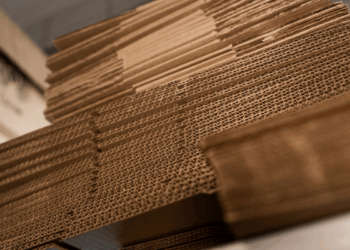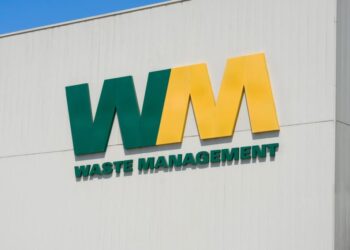
Curbside recycling will likely continue uninterrupted in America’s fourth-largest city, but it comes at the expense of glass recovery.
Houston Mayor Sylvester Turner and a Waste Management (WM) official announced on Friday, March 11 they had reached a deal on a two-year contract. The future of curbside collection for more than 380,000 households was thrown into question when the Houston City Council on March 9 rejected a proposed contract with WM.
Houston’s City Council still has to approve the new contract, which is in the process of being drafted, before it can go into effect. The current contract was set to expire March 16 but has been extended until March 23, the date of City Council’s next meeting.
The city contracts with the Houston-headquartered company to accept single-stream collected materials tipped by city trucks at two WM MRFs.
“The only change in service that Houstonians will notice is the elimination of glass from the list of items that are acceptable for placement in the green curbside recycling bins,” Turner said at a press conference. “Glass is unduly destructive to the processing equipment and breaks during collection and transportation.”
Contract details
The expiring agreement is a “zero floor” contract, through which the City and WM share revenues when the value of the commodities sold exceeds WM’s sortation costs – 70 percent goes to the city and 30 percent to WM under the expiring deal. If commodity revenues fail to cover processing, WM is responsible for the loss and the City pays nothing.
The deal agreed to by Turner and Waste Management would set the processing fee at $90 per ton and eliminate the zero floor, requiring the city to fully compensate WM for shortfalls. It would cost Houston an estimated $2.7 million per year, at a time when the city is already facing significant budget gaps. The deal retains the 70/30 revenue-sharing split, said Darian Ward, press secretary for Turner.
The new agreement also will require the city to deliver at least 75 percent of its stream to WM for sortation. The current contract does not require the City to deliver any percentage of material to WM. By allowing one-quarter of material to be delivered elsewhere, competition for WM could enter the market, Ward said.
In a press release, the City emphasized it won a shorter-term contract than WM had sought and will pay less annually than it would have under previous WM proposals. The publicly traded company had wanted to boost the processing fee from the current $65 per ton to $95 per ton to account for higher sortation costs.
WM says it is losing $1 million annually on handling Houston recycling.
Glass removal
Though the deal will remove glass from curbside collections, Turner emphasized the material will still be accepted for recycling at six community collection depots.
In the press conference, Don Smith, WM’s vice president for Texas and Oklahoma, noted glass is a “negative-value commodity” that breaks and contaminates other material. But the decision to remove it from curbside collections was still difficult, he said.
“Some would call it a painful decision,” he said. “But it was a necessary decision as we worked to put residents interests front and center to effect a solution and meet the city’s recyclables needs.”
In a statement, the Glass Packaging Institute said the removal of glass from the curbside program would lower the city’s recycling rate significantly and increase its disposal costs.
“The City of Houston is a leader in sustainability on many fronts,” the group stated. “Removing glass from recycling is a giant step backwards for their sustainability efforts and their recycling goals.”
According to the Houston Solid Waste Management Department, the city has six neighborhood recycling collection depots, open 9 a.m. to 6 p.m. Wednesday to Sunday, accepting glass and other materials. Limited to using them four times per month, residents must sign in and provide ID showing their residency before they can unload materials.
All glass collected in Houston – whether through curbside collection or drop-off depots – is sent to Strategic Materials, a secondary glass processor headquartered in Houston. Glass delivered to WM is sorted and shipped to Secondary Materials’ facility in Midlothian, Texas, near Dallas.
WM and the mayor traded public jabs last week, but both sides on Friday said they were happy with the agreement, which preserves jobs for the city and WM. Turner called it a “darn good deal.”
WM employs about 150 people at its two Houston-area MRFs, and the agreement avoids layoffs at the facilities.
“We’re very proud of being here in Houston. We’re proud of the City of Houston and we are committed to ensuring that recycling is a long-term viable option for the City of Houston,” Smith said.





























